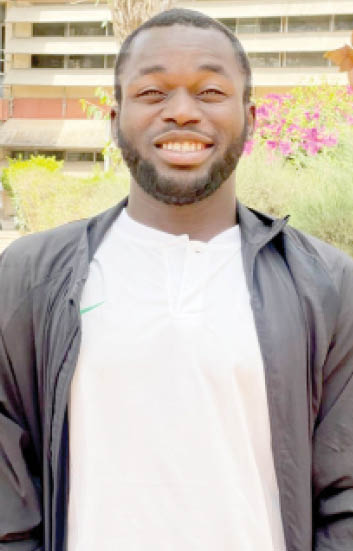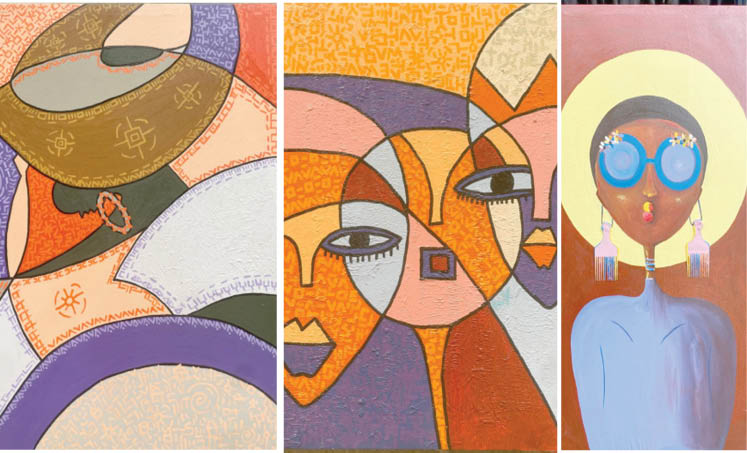Musa Abdulsalam Lamishi is a co-founder of the Art Gallery Lamishi, which is located in Gwarinpa, Abuja. Lamishi believes that “the essence of painting is to experiment with various mediums and colours that will inspire him to create aesthetic works that capture the lives of ordinary people in society. In this interview with Daily Trust on Sunday, Lamishi shares his beliefs and experiences as an artist.
What inspires your art the most, and how do you translate that inspiration into your work?
The most inspiring aspect of art lies in our depiction of African society’s imagery and fashion style, which have been overlooked in favour of emulating modern lifestyles. Therefore, I have chosen to draw attention to this issue through art by creating pieces that symbolize African imagery and celebrate the love for our unique fashion styles within society.
If you could collaborate with any artist, living or deceased, who would it be and why?
“I would love to collaborate with other artists such as Maryam Maigida, Clement Mmaduaka Nwafor, and others, as their work largely revolves around the African lifestyle. They depict African images, motifs, and utilize local materials within their environments. Their art draws attention to the significance of our culture, allowing upcoming artists to understand how it can be recognized wherever we go.”

How has your style evolved over the years, and what prompted those changes?
I have developed my art style from cultural background and some ideas from the ISIBINDI motif which gave me the confidence in understanding the motif and I developed by using the African images and African life style of surviving.
Can you share a piece of artwork that holds a special significance to you, and tell us the story behind it?
African beauty: I chose to create this art piece as a depiction of African beauty, recognizing that we Africans possess inherent gifts and uniqueness, reflected in our blackness and distinctive local fashion. The artwork showcases cultural fashion styles and highlights how we can be easily identified both within and outside our country. African women are particularly special due to the natural elements we use to enhance our beauty and the diverse hairstyles that distinguish us from others. This uniqueness may sometimes evoke envy from others, but it is a divine gift that cannot be replicated.
Are there recurring themes or motifs in your work?
Yes, they are a current motif in my works, particularly the ISIBINDI motif, due to the significance of each symbol derived from African imagery. Additionally, I create my own motifs inspired by the Gbagyi cultural background. These motifs represent concepts such as energy, love, heart, good luck, wealth, unity, and more. Each motif imbues the works with profound meaning, allowing them to communicate effectively with the audience and viewers. The calabash carried on the shoulder by the Gbagyi signifies that the head is special and should not be used for carrying loads.
What’s the most challenging aspect of being an artist in today’s world?
Hmm, the most challenging aspects of being an artist in today’s world are the cost of art supplies and low patronage. These issues force some artists to divert their skills to other fields because the high cost of materials and lack of clients can cause them to lose interest. Many feel that a white-collar job could pay better. If you can’t afford the costly art supplies and don’t have clients to buy your art pieces, it can be very discouraging. The cost of art supplies is really a big problem for us as artists.
Are there unconventional tools or materials you like to use in your art?
I hardly use some of these unconventional tools because preservation of artwork is really an important thing to every artist. Why? Because you can’t use some materials to create a beautiful art piece and at the end of the day, you won’t be able to preserve it well for future projects or purposes, so I prefer to use the normal and available tools I find around me and I see other artists use in creating artworks.
How do you stay motivated and overcome creative blocks?
I push myself to create artwork when I experience a creative block in my thought process. In this situation, sometimes I make several sketches of any ideas that come to my mind. I have to put them down to prevent myself from forgetting them. And sometimes, I draw inspiration from masters or other artists’ references to help me think quickly and have in mind what to do and how I can approach it to ease my creating. Online references also help me in easing my thinking ability, fostering our creative process.
What advice would you give to aspiring artists who are just starting their creative journey?
As an upcoming aspiring artist, it’s really a challenge: people seem to give up easily because of the low patronage and the cost of art supplies. So, you really need to believe in yourself and dedicate your time. No matter what, you won’t give up because everything in life is a matter of time before you achieve success. As an upcoming artist, you don’t have to look at the way Mr. A is selling; you don’t have to sell yours at that price range. Doing that, you may end up achieving nothing because what Mr. A has seen or achieved is not the same as what you have experienced. So, you have to start from small to big in order to achieve success.
How does your cultural background influence your art?
Cultural background influences art in many different ways. Where you come from and how you grow up determine what you see and how you perceive people doing things, which reflects in some of your works. You wouldn’t expect someone who didn’t grow up in a village to depict the real-life cultural background, which allows you to understand the cultural identities of your local background.
Do you have any rituals or routines that you follow before starting a new piece?
No, I don’t believe in any rituals before becoming a great artist. What I believe is that the more you are consistent with your practice, dedication, and mind-set, the faster you can think; it becomes almost like magic. Art itself possesses spiritual power, depending on how one perceives and cherishes it, which may lead a client to interpret the work in various functional ways.
Can you share a memorable interaction or experience you’ve had with someone who viewed your artwork?
Some of the memorable experiences I have come across involve meeting collectors and clients who want to understand how I developed my skills and became proficient. When this happens, I take them back to my secondary school days in 2012-2013 when I first discovered my passion for art. Since then, I have been practicing continuously, and I am still dedicated to improving because learning never ends. Art is not merely like a book where understanding can come without reading; it is beyond that. The more you practice and dedicate yourself to it, the better you understand the conceptual knowledge required to become a skilled painter.

 Join Daily Trust WhatsApp Community For Quick Access To News and Happenings Around You.
Join Daily Trust WhatsApp Community For Quick Access To News and Happenings Around You.

